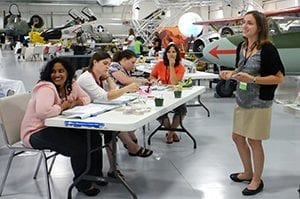News
Teachers Share Strategies for Inspiring Tomorrow’s STEM Researchers

BTI Teaching Lab Coordinator Becky Sims leads a switchgrass germination classroom kit activity at the BBEP 2015 national conference held at the Wings of Eagles Center in Horseheads, N.Y.
Science teachers planted switchgrass seeds, sampled algae-glycerin soap, and participated in roleplaying activities at the Bioenergy and Bioproducts Education Program’s National STEM conference last week. The conference, which was co-hosted by BTI’s Education and Outreach Program, brought together educators interested in teaching about plant-based energy and bioproducts with scientists and other experts solving sustainability problems with plant technologies.
Teachers participated in a variety of lectures, demonstrations and workshops focusing on methods to teach about plant-based biofuels and other plant products and how these materials can become integrated into the new “bioeconomy.” The program received funding from the U.S. Department of Agriculture to encourage students to pursue careers in much needed STEM fields.
Over 400 science teachers have participated in BBEP programs in the last five years, across eight partner sites, including BTI. Organizers invited 21 outstanding alumni to present at an Alumni Impact Poster session, which was conceived of and developed by BTI Director of Education Tiffany Fleming. In the session, teachers detailed their experience with BBEP programs and how they used this curriculum in the classroom.
“For five years we have introduced teachers to new advances in biomass-to-bioenergy sciences, including a lot of curriculum. But behind that content is the process of scientific inquiry, which includes sharing results with peers. I wanted to create an opportunity where the teachers were the experts, and experienced first hand this important aspect of science.”
Five of BTI’s own teacher institute alumnae presented posters about using BBEP in their classrooms:
Growing Biofuels: Germination!
Kimberly LaCelle, Wheatland-Chili Central School District, Scottsville, NY
“It’s a really good way to talk about how you start to scientifically solve a problem…When you’re attacking a scientific problem, it’s not just going to be solved with one experiment, it’s a process. And I think a lot of the students are surprised when they think about how long it takes to actually start making some progress. They have new appreciation for new technologies. It’s a simple experiment, but it gets at a bunch of ideas.”
Teaching and Learning Ecology Using a Classroom Algal Photobioreactor
Karen Horikawa, Wilmington Friends School, Wilmington, DE
“The study of biofuels and the algal photobioreactor lab were real eye-openers for my students. The need to develop sustainable alternatives to fossil fuel for the future became clearer and more real to them through their investigations. They appreciated the need to find feedstocks, growing conditions, and processes that will make biofuels viable energy sources, and they especially felt good about engaging in the same kinds of lab work that real scientists are doing in this field. I think my students came away with a pretty good feeling that there is work that needs to be done in the future and that they can be a part of this important work.”
Investigating Varying Conditions to Maximize Algae Growth as a Potential Fuel Source
Gary Silverman, RJK Middle School, Monticello, NY
“In terms of student engagement, it’s one of the best things I’ve ever done…In terms of truly immersing children in the scientific method and the experimental process, this was a more complete experience [than previous activities] because they built, they designed, they incorporated their math and reading skills, and saw it all the way through to drawing conclusions from their own unique set of experiments.”
“My experience at BTI was about as good an experience as a science teacher can have. It leaves you energized and with lots of new ideas to try.”
Sowing the Seeds of Sustainability
Kelly Mackey, Islip High School, Islip, NY
“In AP environmental science, there are a lot of labs where the teacher knows exactly what the outcome is going to be. This was very open-ended and every year is different based on what seeds BTI sends me. I don’t have any idea what the right answer is.”
Growing Algae in a Community College Biology Course: Inquiry Into The Algae-to-Biodiesel Pipeline
Pushpa Ramakrishna, Chandler-Gilbert Community College, Chandler, AZ
“Communication is so important in science and I feel strongly about using written and oral discourse in the classroom. For example, at the end of the inquiry-based lab on algal photobioreactors, where my students in collaborative groups of four, designed and conducted their different experiments, the students analyzed their results and discussed their conclusions; they determined if their hypothesis was supported or falsified; the kinds of recommendations they could give on optimal algal growth; and then we had a whole group discussion where every group presented their findings to the entire class.”

